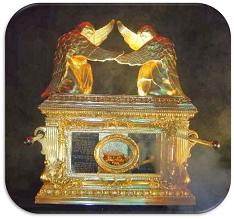Angels (Parts 1-3)
Angels (Parts 1-3)
Part 1: God’s Special Servants⤒🔗
There have been times in history when belief in the existence of angels was seen as something for children, just as the belief in fairy tales. Reasonable, thinking people classed themselves far above such folk beliefs.
That time is past, so it seems. Nowadays, since the religious climate is such that man can and may believe practically anything, it is also acceptable to believe that angels exist.
For people who are convinced of the absolute trustworthiness of the Word of God, the belief in the existence of angels is not connected to a particular religious climate. For them, it is enough that the Lord himself speaks about angels. For them, it is therefore also important that they may rightly know what angels are, what they do, and what the relationship is between people and angels. (See the Belgic Confession, Article 12.) Therefore, it is also useful for us, to pay attention to these fellow creatures. Much can be learned from them. Through them, we may also learn much about God.
Created Beings←↰⤒🔗
Our point of departure is the given, that also the angels, like us, came forth out of God’s thoughts. Just like us, they were called into existence through God’s voice. They were also created with the purpose that they would exist to the honour of their Creator. There are more things that we, as people, have in common with them. But there are also noteworthy differences.
 People were created as children of God. Angels are servants. For this reason man has a higher rank. This position of the angel as servant includes that he, on the command of the Lord, also serves the son.
People were created as children of God. Angels are servants. For this reason man has a higher rank. This position of the angel as servant includes that he, on the command of the Lord, also serves the son.
When man sins, he wanders away and becomes a lost son, who by persisting in his sinful ways becomes lost as a child. However, when the servant sins against God, God can dismiss him, something he cannot do to a son. There have been servants who have been discharged, namely, those servants who were disobedient and rebelled against God. For them, a return is impossible; for a lost son repentance is possible. These are things that we will return to.
Incidentally, the servants are exceedingly glorious and majestic creatures. This is apparent from the names given to them, names such as “thrones, dominions, authorities, rulers” (Col. 1:16). No, they are not as high as Christ. God has never said to any of the angels what he has said to his Son (Heb. 1:4, 5, 6). For this reason, the angels are spurred on to worship the Son of God. When it is said of Christ that he was made a little less than the angels that refers to his becoming man and his state of humiliation.
We know when man was created: the sixth day. However, when were the angels created? It is generally accepted that their creation took place at the same time as the creation of heaven. That happened at the same time, based on Job 38:7. When the earth’s foundation was laid and its bases were sunk, the morning stars sang. Those “morning stars” are angels, as are “the sons of God” mentioned in the same verse. Therefore, they already existed when the earth came to be.
That the angels were given the name “morning stars” also has a special meaning. The morning star announces the end of the night and the beginning of a new day. Such was the case at the creation of the earth. When the earth was formed, it was desolate and dark. That changed as soon as God began to speak: let there be light. The morning stars already announced that.
That’s what the morning stars are doing. On Christmas Eve, on Easter morning. However, when the sun breaks through, the morning stars pale. When Christ appears, the lustre of the angels diminishes.
Liturgists←↰⤒🔗
Naturally, angels were created for a purpose. In general, that purpose is the same as the purpose of all that was created: the honour of the Creator. How are the angels meant to achieve that purpose? They are God’s special servants. In Hebrews 1:14, they are called “ministering spirits.”
 “Spirits” refers to their not having bodies and being invisible. Exactly this invisibility has led men to deny their existence. As if things that are invisible are therefore not real.
“Spirits” refers to their not having bodies and being invisible. Exactly this invisibility has led men to deny their existence. As if things that are invisible are therefore not real.
These spirits are “ministers.” Actually, we should translate this with the word “liturgical.” The word “liturgy” used to be connected with service in the palace, service to the monarch, service to country. Due to the fact that serving the monarch gained more and more religious overtones, the word “liturgy” also became applied more and more to religious context. It became the word to signify the worship service.
Angels are therefore servants of the kingdom. They stand in a very direct relationship to the King, the Lord of heaven and earth. To gain some impression of the nature of that relationship, we must turn to the vision Isaiah had when he was called (Isa. 6).
Isaiah saw the seraphim, a particular category of angels. He saw them around the throne of God. All had six wings, divided into three pairs. With the first, they covered their eyes—a deep respect for God, their Maker. With the second pair, they covered their feet—indicating their carefulness: they will never venture forth unless they first receive a command to do so. With the third pair of wings, they fly—indicating their preparedness to depart immediately, as soon as they receive a task requiring departure. For this reason, a verse in a psalm says that they watch in readiness for the Word from the mouth of God.
This is what God shows Isaiah when he is also calling him into his service. Now Isaiah knows how he is to fulfil his calling. “On earth, as it is in heaven.” Rightly, our Catechism points out to us in its explanation of the third petition of the “Lord’s Prayer” that everyone is to fulfil his calling in this manner. The angels are an example for us.
Glory←↰⤒🔗
This high position of the angels brings with it that the angels, when they carry out their tasks on earth, are enveloped with some of the glory of heaven. When they appear to people, those people react with fear because of the majesty that emanates from them. Fear fills the shepherds in the fields of Ephrathah (Luke 2:9). Fear overcomes the women on Easter morning (Luke 24:5). Daniel falls on his face on the ground and his fellow travelers try to hide themselves when an angel appears (Dan. 10:7, 9).
 It is therefore not a little thing to see an angel, a messenger directly from God. Truly, angels look quite different from what we sometimes see depicted on church organs: babies with bare bottoms and a tiny trumpet in their mouths.
It is therefore not a little thing to see an angel, a messenger directly from God. Truly, angels look quite different from what we sometimes see depicted on church organs: babies with bare bottoms and a tiny trumpet in their mouths.
Let’s not fool ourselves.
God makes his angels spirits (or winds), flames of fire. Imagine, wind and fire. Powerful forces that cannot be tamed. Irresistible, whether they come with a joyful message or a threat of punishment. They are always impressive and imposing, certainly when they hold the four winds (Rev. 7:1) or cast fire on the earth (Rev. 8:5, 7).
Besides majesty, the manner in which they serve the Lord also shows their faithfulness. For example, in what they do with regard to the Lord Jesus. An angel appears to Joseph in a dream to tell him that he must flee to Egypt with the child and his mother (Matt. 2:13). After the devil tempts Jesus in the wilderness for forty days, the angels come to minister to the Son, to supply him with food (Mark 1:13). An angel comes to him in Gethsemane, during his intense suffering, to strengthen him (Luke 22:43). In this manner, the angels render their service as liturgists to the great King, and God rejoices in this service. After the catastrophic happenings—the rebellion of a section of the angels in heaven and the fall of man into sin on earth—God still retains the faithful service of angels. Yes, God experiences joy here.
Serving God with Joy←↰⤒🔗
What about the angels? They also know joy when they serve God. During the vision in which he was called, Isaiah heard how they sang, “Holy, holy, holy is the Lord.” Totally understandable! They experienced that many of their fellow angels rebelled against the Lord. Under the leadership of one of them, they endeavored to dethrone God. Then it was for all angels to choose: to whom do we want to belong? And those who chose to remain faithful to God then became witnesses that God, to his great sorrow, had to experience that a portion of his good creation was destroyed.
Following that, the faithful angels also saw that man abandoned God. Again there was sorrow in heaven. The angels knew that the Lord regretted that he had made man on earth and that it grieved him to his heart (Gen. 6:6).They so wholeheartedly loved their God, that they sorrowed with him over the destruction that overcame God`s creation, in heaven as well as on earth.
Is it saying too much when we assume that those angels who remained faithful now serve God with redoubled zeal and honour and glorify him with extra love?
Part 2: Warriors, Expounders, and Evangelists←⤒🔗
Angels were created to serve God. This service, which they perform with great faithfulness and heartfelt dedication, takes different forms. One of those forms is the fight against all that shows enmity toward and opposes God.
Warriors←↰⤒🔗
God has enemies. Even though he is only good, he has enemies. First of all in the spiritual world. Those angels who fell, who were transformed into devils, live in continuous opposition to him and to everything he does. God is actively renewing what was destroyed through sin, the devil with all his forces tries to oppose God’s work. When God is busy with rescuing sinners and allows his gospel to be proclaimed to them for that purpose, then “the spiritual forces of evil in the heavenly places” as they are referred to (Eph. 6:12), do their utmost to render all this impossible. Also in God’s rule, which he exercises in this world, the powers of darkness thwart him. However, in this battle, God can call upon his holy angels who function as warriors.
It is primarily the so-called apocalyptic literature of the Bible that informs us of this. Very special are the books Daniel in the Old Testament and Revelation in the New Testament. Let’s look at two examples.
Conflict in the Spiritual World←↰⤒🔗
Daniel 10 tells us the answer that God sent to Daniel for his prayer that we find in chapter 9. Once Daniel has prayed that prayer, he is required to go on a journey of service. During that journey, he is in the neighbourhood of the Tigris River. There “a man” appears to him. He is clothed in white. He wears a golden belt. Everything about him is imposing. Daniel is frightened. It is immediately apparent to him that this is an angel, a messenger from God.
 The angel says that he has come to bring Daniel an answer. He also tells Daniel why he did not come earlier. There is a period of twenty-one days between Daniel’s prayer and the arrival of the messenger. “The prince of the kingdom of Persia” stood in the way of the messenger. Only when Michael came to help him was he able to proceed. Michael took over in the battle against the opponents. Moreover, the messenger’s time is limited since he must return with haste. Another battle awaits him. First the prince of Persia must be defeated; thereafter, the prince of Greece. In all those battles, Michael will give his aid.
The angel says that he has come to bring Daniel an answer. He also tells Daniel why he did not come earlier. There is a period of twenty-one days between Daniel’s prayer and the arrival of the messenger. “The prince of the kingdom of Persia” stood in the way of the messenger. Only when Michael came to help him was he able to proceed. Michael took over in the battle against the opponents. Moreover, the messenger’s time is limited since he must return with haste. Another battle awaits him. First the prince of Persia must be defeated; thereafter, the prince of Greece. In all those battles, Michael will give his aid.
Much is not totally clear in a vision such as this. But so much is sure, that here what is spoken about is a battle in the world of spirits, a battle between good and evil spirits. God’s angels are continuously occupied in a struggle with demons. Those demons situate themselves, preferentially, in the state buildings of rulers. Therefore, it speaks about the “prince of Persia” and the “prince of Greece.” Satan has situated one of his demons in the state buildings of Persia and of Greece, who, in those places where important decisions are made, attempt to exert their influence.
Revelation 12←↰⤒🔗
Again, Revelation 12 is a portion of the Bible where we are given an impression of the happenings in the world of spirits. There we find a vision of things that took place when Jesus ascended to heaven. At that time, war arose in heaven. The dragon—the devil—had already tried to prevent the birth of the Child, but he did not succeed. The Child was taken up to God. However, the devil did not give up because of that. He undertook, together with his hellish followers, an assault upon heaven with the purpose of yet bringing Jesus under his power.
At that point, the armies of hell found the armies of heaven blocking them. Those armies, under the command of Michael, withstood the armies of the devil. The devil lost the battle. He could not gain power over the Child. On the contrary, he was cast out of heaven. He no longer has a place there. He no longer has access to heaven. He can no longer do his work of accusation and indictment there.
Was he able to do that earlier on? We could speak at length about this, particularly when we reference Job 1 and Zechariah 3. However, we are not speaking about the topic of the devil, but rather, the angels. So we will leave this for now. But it is interesting and important.
There is a spiritual warfare going on. So much is clear to us from these Bible references. A battle in which the first question is, who is God and who is the ruler. But this battle is also about man. Are the angels winning, or are they experiencing defeat? The answer to that question is of utmost importance for mankind and for the question whether man can be saved.
Besides, God’s children are also involved with that spiritual wickedness. Paul warns against this and urges believers to arm themselves. He urges them to put on the armour of God. Only in this way will they be able to remain standing.
In this battle, the Lord also puts his angels at the service of his people. They serve not only God but also the people of God, the restored sons, by God’s grace.
Interpreters of Scripture←↰⤒🔗
This service of God’s people becomes very clear in yet another task that the angels accomplish as servants of the kingdom. In the vision during which God calls Isaiah to his service, Isaiah saw that the angels also have two wings for flight. And fly they do, when they have a task to carry out. That happens also when they have messages to bring and explanations to give. In that work they serve God, but it is apparent at the same time that in this manner, they also serve God’s children. The messages brought by the angels are meant for the people and are of immediate concern to them.
God desires to make his will known. From time to time, he also reveals something of his plan of salvation. Also for this purpose, he uses the angels. He can trust them. They will be faithful in bringing his Word. They themselves also rejoice at everything that God reveals, everything that has to do with the restoration of all that has been lost because of sin.
It was an angel who explained to Zechariah what the Lord revealed to him in different night visions (Zech. 1:14; 2:3). Likewise, it was an angel who gave Ezekiel explanations, an angel who interprets (Ezek. 40:4; 47:1). In these instances, we can call the angels interpreters of Scripture, exegetes. They are busy with the explanation and declaration of God’s Word.
The angel Gabriel also functions as exegete in Daniel 8. Daniel has seen the vision of the ram and the male goat. The goat overpowers the ram and thereafter strengthens himself greatly. Everything the goat undertakes succeeds. However, Daniel does not grasp the meaning of all this. Then Gabriel comes to give him the explanation. In the following chapters, it is again Gabriel who comes with a message from heaven, in which he may share with Daniel that the Lord has heard Daniel’s prayer and will give deliverance. God arranges that we have his Word. He also arranges that we will receive the explanation of his Word. Don’t we have need of both?
Evangelists←↰⤒🔗
Besides being exegetes, the angels are also evangelists, bringers of the good news. When Gideon received the visitation of an angel, that angel proclaimed to him the message that the Lord would bring deliverance (Judg. 6:11ff.). Samson’s parents received a similar message via an angel (Judg. 13:5). And the angel Gabriel, the same as in Daniel, returns to earth in the days of the New Testament. He is a messenger of the gospel as he appears to Zechariah and announces the birth of the one who is the forerunner of the Messiah (Luke 1:13ff.). He is certainly an evangelist when he announces to Mary that she will be the mother of the Redeemer (Luke 1:31ff.).
 The angels who announce what has happened at the birth, the resurrection, and the ascension of the Lord Jesus are also evangelists (Luke 2:10; Matt. 28:5-7; Acts 1:11). They are ministers of the gospel. No, they are not participants in the acquiring of salvation. They are not a kind of mediator. The acquiring of salvation is exclusively the work of Jesus Christ. As well, also the application of salvation is exclusively the work of Jesus Christ, who administers it through his Spirit. The angels are allowed to be involved in the proclamation of salvation. We must add here that also this work was only temporarily entrusted to the angels, only until God’s salvation was fully revealed. Actually, their task in this respect was already diminished earlier on.
The angels who announce what has happened at the birth, the resurrection, and the ascension of the Lord Jesus are also evangelists (Luke 2:10; Matt. 28:5-7; Acts 1:11). They are ministers of the gospel. No, they are not participants in the acquiring of salvation. They are not a kind of mediator. The acquiring of salvation is exclusively the work of Jesus Christ. As well, also the application of salvation is exclusively the work of Jesus Christ, who administers it through his Spirit. The angels are allowed to be involved in the proclamation of salvation. We must add here that also this work was only temporarily entrusted to the angels, only until God’s salvation was fully revealed. Actually, their task in this respect was already diminished earlier on.
That makes us take note of the fact that the angels are active in the preaching of the Word at Christmas, Easter, Ascension Day, but not at Pentecost. There, people take over the work from the angels. Peter stands there, with the other apostles, and proclaims the great works of God. This was the goal to which God was working. Servants do the work until the children are able to take over. The servants delight in this, for they see that God is active in achieving his goal.
Part 3: Deacons and Disciples←⤒🔗
The service of angels is—as we have seen—first of all focused on God. They serve him as heroic warriors. But their service is also directed to people. Those people who through grace are reconciled to God, returned prodigal sons. When the angels fight against God’s enemies, that battle is meant not only to defend God’s honour and serve God’s decrees, but also, simultaneously, to protect God’s children. When the angels serve God as messengers and proclaimers of his Word, they serve at the same time also God’s church, which through them hears that Word of God.
Deacons←↰⤒🔗
Besides this, there are several other areas in which the angels serve “those who are to inherit salvation.” That is how they are referred to in Hebrews 1:14. Previously, we already referred to that text. There the angels were called “ministering spirits,” “liturgical spirits,” servants of the kingdom.
These ministering spirits perform yet another service besides being servants of the kingdom. They are sent out to “minister” to those who are to inherit salvation. As we again use the word “minister,” this time it denotes another kind of service. Not “liturgy,” kingdom service, but “deacon service,” serving people who need help. For this reason, we will refer to the angels as deacons.
This is therefore a different kind of work. Deacons aid the poor and needy members of the congregation. They have a task where there is a need and where people need aid. Angels are, apparently, also helpers, helpers in time of necessity.
Those to whom help is given are “those who are to inherit salvation,” heirs. They, however, are not yet in possession of the inheritance. As long as that is the case, they are often poor and needy. Repeatedly, they are referred to in the Bible as destitute.
They are poor. Yet they are rich. An inheritance awaits them, safely kept. That inheritance is kept in heaven, “imperishable, undefiled, and unfading” (1 Peter 1:4). Kept for the heirs. Meanwhile, also the heirs are safeguarded for the inheritance and, in this safeguarding, the angels as God’s deacons have a task.
Protection←↰⤒🔗
What belongs to the angels’ diaconal task? Genesis 28:12, 15 says something about the protection they offer, and under which Jacob was placed. They also give protection to Elisha and his servant when they are in Dothan while it is being besieged by the Syrian army (2 Kings 6:16, 17). Psalm 34:8 speaks about the Angel of the Lord who encamps around those who fear God. A large section of Psalm 91 is devoted to the protection and help that God’s children receive from the angels.
 Based on these and similar passages in Scripture, Calvin says, “In this manner, God provides bountifully in our weakness, when he provides us with such helpers that range beside us to withstand Satan and assiduously apply themselves in order to preserve and protect us.” Calvin is correct. This is borne out in the words that Jesus speaks in Matthew 18:10 when he refers to the angels and the “little ones.” Those “little ones” are especially entrusted to the care of the angels. That does not imply that every one of God’s children has a particular guardian angel. All angels are guardian angels for all God’s children.
Based on these and similar passages in Scripture, Calvin says, “In this manner, God provides bountifully in our weakness, when he provides us with such helpers that range beside us to withstand Satan and assiduously apply themselves in order to preserve and protect us.” Calvin is correct. This is borne out in the words that Jesus speaks in Matthew 18:10 when he refers to the angels and the “little ones.” Those “little ones” are especially entrusted to the care of the angels. That does not imply that every one of God’s children has a particular guardian angel. All angels are guardian angels for all God’s children.
As long as the children of God are here on earth, awaiting the inheritance, they are safely kept. When the end of their life approaches, the angels perform another, unique diaconal task. They are present at the death of an heir. When the moment of death comes, they carry the soul to heaven (Luke 16:22).
Are these words spoken by Jesus figurative and therefore not to be understood literally? Whatever you think, for me this thought has often been a rich comfort. In my mind’s eye, when I am in the room where a child of God is dying, I see the angels standing, waiting for the moment when they will perform their task. This happens before the patient is “laid out” and the undertaker begins to do his work. The angels bring the heir home, even when that heir was a social outcast like Lazarus, who had only dogs to keep him company.
That gathering and bringing home is also the diaconal work of the angels on the day of Christ’s return (Matt. 13:39; 24:31). Comforting thought! Soon the graves will be opened, also those of the heirs. Imagine it if you can. Will those risen heirs look about themselves in a perplexed manner, not quite knowing what they need to do? No need of that! There is a deacon near at hand who unerringly knows the way home.
Students←↰⤒🔗
After having shown us what the angels do in the kingdom of God and in their diaconal service to God’s children, the Bible shows us yet another totally different aspect. Angels function more than once as messengers, from whom people can learn. It is also true in reverse. There are things that the angels do not know and would readily like to know, things which have to do with God and his work, especially his work of salvation.
They know much about this. Many times, it was granted to them to speak about it. On Christmas, on Easter. However—we saw this earlier—when Pentecost comes, they are silent. Why? Because, at that time, in God’s history of salvation, something happens which they cannot fully understand. Now there are people who have more insight than they do. Now it is the people’s turn. Many people in Jerusalem listen to the message brought by Peter, but the angels also listen.
Why is that? On Christmas, Easter, and Ascension Day it is about the process of making salvation possible. The angels saw these events happen and rejoiced. At Pentecost, it is about the application of that salvation, and in this the angels are personally excluded. No matter how closely involved they are, they do not know from experience what it is.
 They know much about God, that he is righteous and almighty and merciful and all-knowing and much more. But what it means that he is merciful and gracious, they do not know. They have never needed grace. They have never needed to be shown mercy. Mercy is something that is needed only by unworthy sinners. That does not apply to the angels.
They know much about God, that he is righteous and almighty and merciful and all-knowing and much more. But what it means that he is merciful and gracious, they do not know. They have never needed grace. They have never needed to be shown mercy. Mercy is something that is needed only by unworthy sinners. That does not apply to the angels.
Yet, they do desire to know as much about it as they can. They love their God, so much so that they desire to know everything about him. For that reason, they pay such strict attention to God, especially when he shows mercy.
Do you understand why the faces of the angels who were to be placed on the ends of the mercy seat of the ark of God, had to be turned towards the mercy seat (Ex. 25:20)? Peter refers to this when he speaks about the good news, “things into which angels long to look” (1 Peter 1:12). The blood of atonement was sprinkled on the mercy seat; the blood through which reconciliation was made. Through that blood, God could again graciously receive the sinner. That blood covered the guilt. That blood declares the mystery of God’s undeserved mercy to unworthy people. Therefore the angels were so involved with everything Christ came to do, with the offering that he brought and with the blood that he shed. When he, having fulfilled his work—work of which the angels had seen that it satisfied God—returned to heaven, the angels also welcomed him.
God’s Joy – Their Joy←↰⤒🔗
But what they are extremely drawn to is when the work of Christ begins to bear fruit in the life of a sinner, and when that sinner repents and turns to God. Then they see the joy in the face of God about a repentant sinner, and seeing that joy, they also experience joy. God’s joy is their joy (Luke 15:10).
Their task is not yet finished. They continually receive new tasks. To open the door of the prison so that Peter and John are set free (Acts 5:12). Once again to free Peter (Acts 12:7-11). To command Cornelius to send for Peter (Acts 10:6). To encourage Paul during a frightening sea voyage (Acts 27:23). And to do many more tasks.
Meanwhile, they are eager to learn in order to come to know more about the work of the Lord whereby sinners share in salvation. From whom will they be able to learn this? Who explains to them what the “manifold wisdom of God” is? That is the task of the congregation (Eph. 3:10). The congregation has received and has learned much from the angels. Now the angels desire to receive something in return from the congregation. They anticipate that the congregation—the heirs—will reveal to them the manifold wisdom of God. They listen when the wisdom of God is spoken of within the congregation. Also when it is sung. When the heirs speak of it among themselves. And they also yearn to see that the wisdom of God is displayed visibly in a holy walk of life within the congregation, a walk of life that mirrors their own. Therefore, they are present in our worship services. What do they hear? What do they see? Do they have reason to rejoice? Or do things happen there that grieve them? Does “because of the angels” from 1 Corinthians 11:10 have any significance here? Does not a logical consistency flow forth from the words of the apostle, which touches the manner in which we dress and the manner in which we behave during the church services that we attend?
These articles were translated by Elizabeth DeWit.

Add new comment